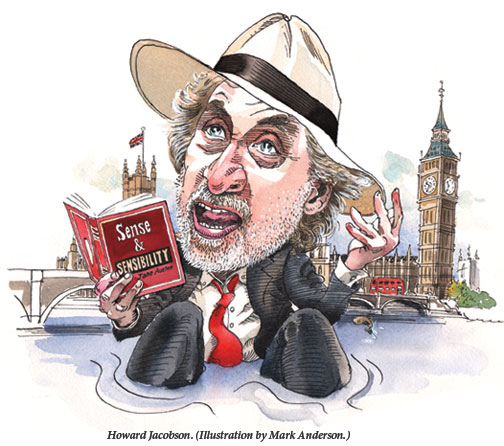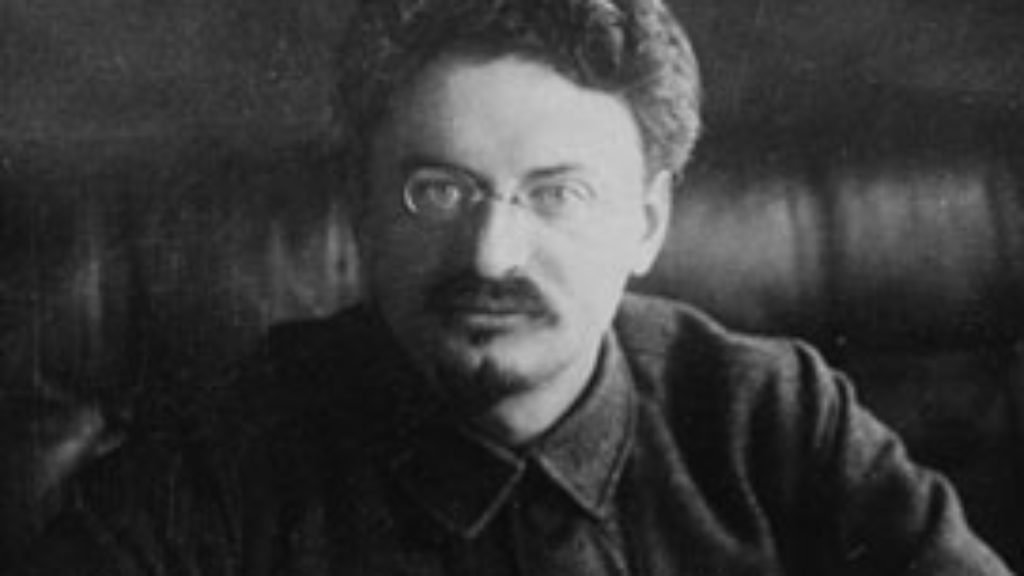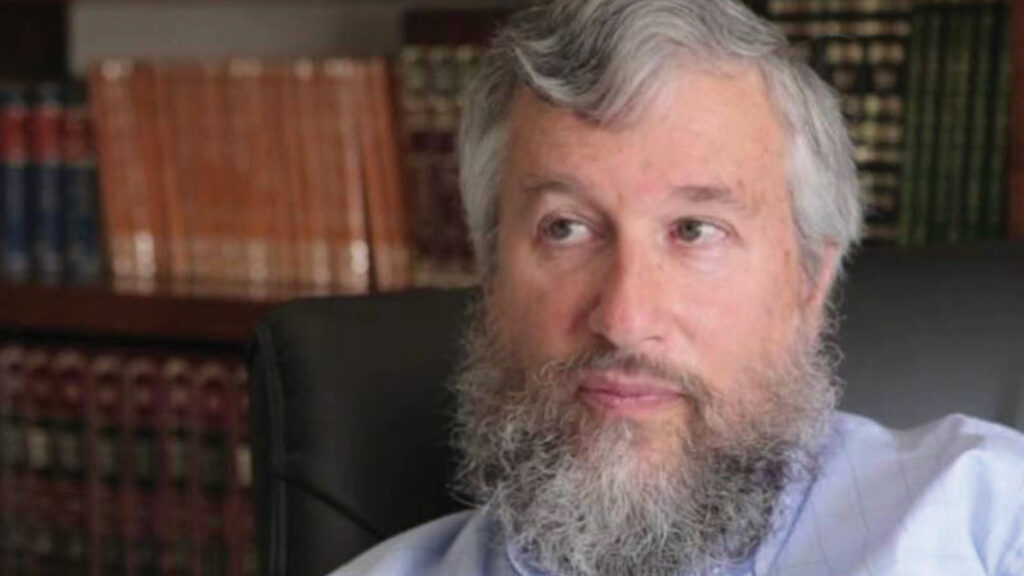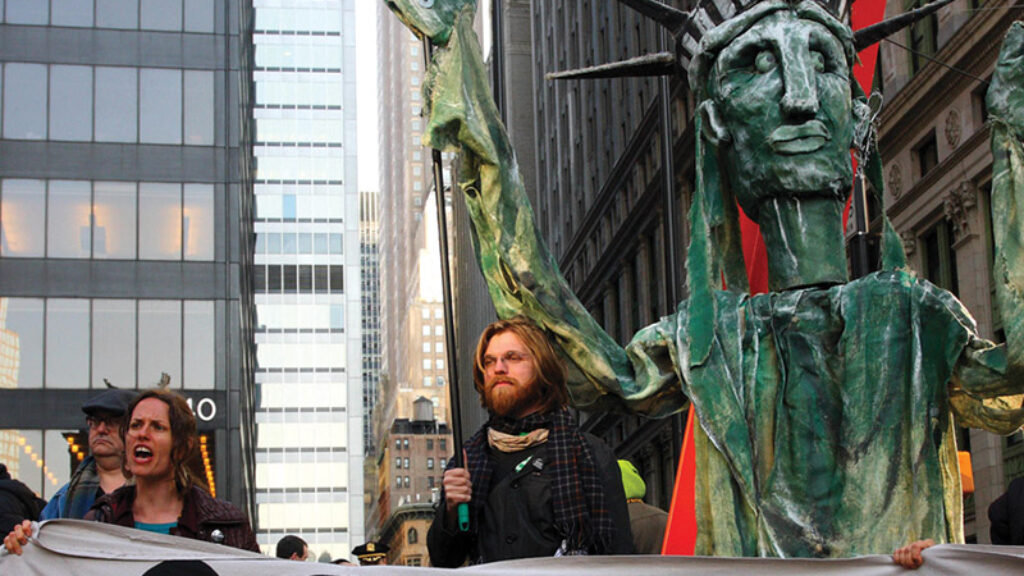The Mighty Jacobson
“Christendom,” one of the contrasting histories imagined for Nathan Zuckerman in Philip Roth’s The Counterlife, finds Zuckerman visiting his wife Maria’s family in England. In the climactic scene, the American Jew and his English wife are at dinner in a restaurant when an elderly woman at another table stares at them and loudly tells the waiter, “You must open a window immediately—there’s a terrible smell in here.” Zuckerman, convinced that this is anti-Semitic jibe—”She is hypersensitive to Jewish emanations”—stands up for himself and confronts the woman, to the dismay of Maria, who thinks he is “being absurd.” What makes the scene so exquisitely uncomfortable is that it’s impossible to be certain whether the insult Zuckerman hears really is an insult. Is the consciousness of Jewish difference more acute among the English or among the Jews themselves? Is anti-Semitism real or a figment of the imagination—and which is more destructive of Jewish self-confidence, a real threat or a threat one can never be sure is real?
Imagine this uncertainty prolonged from a dinner to a lifetime, and you begin to enter the psychological world of Howard Jacobson, who is both a magnificently funny writer and one of the most serious Jewish novelists at work today. For an American Jew to read Jacobson is to understand just how different the situation of English Jews is from our own. It has been several generations since most American Jews would profess themselves uncomfortable in America—alienated, self-conscious, knowing themselves to be here on sufferance—the way Jacobson claims to be in England:
What’s sacrosanct about ease? Nothing about this country has ever put me at ease. I didn’t feel at ease when processions of weeping Catholics passed my house carrying plaster saints. Didn’t feel at ease at school when they sang hymns in assembly about famous men I’d never heard of, or accused ‘some boy’ of stealing toilet rolls. Didn’t feel at ease at university where . . . moral tutors called me Abrahamson, Isaacson, Greenberg, and Cohen. Don’t feel at ease in the Atheneum, or Glyndebourne, or the Courts of Justice, or any police station, racetrack, garden fete, rap concert, or pole-dancing establishment. Many are the ways a person whose family hasn’t owned land on these islands for a thousand years might feel frightened, discomfited, embarrassed, or just not one hundred per cent at home.
This tirade comes from Whatever It Is, I Don’t Like It, a collection of the columns Jacobson writes for The Independent newspaper. But the sentiment Jacobson avows here can be found again and again in his fiction, where it is the spur for some of his most frantic comedy. Take the scene in his first novel, the campus comedy Coming from Behind, published in 1983. Sefton Goldberg, the thwarted professorial anti-hero, is “used to Gentiles making him uncomfortable. One way or another they all did.” When Goldberg gets into a standoff with his colleagues over a parking space, he defuses his fear of anti-Semitism by wildly inviting it:
He would have loved them to say something about Jews. In his present responsive and vibrating state he could have picked up an anti-Semitic remark delivered in a guilty whisper a hundred miles away. In an attempt to elicit one a little closer to hand he shrugged his shoulders in an exaggerated manner like Topol, fiddled with his nose like Jonathan Miller, squinted like Menachem Begin, mopped the sweat from his neck like Itzhak Perlman, and in that voice which ancient money-lenders employed to deny they had just devoured a pair of Protestant babies in their soup he repeated, smacking his rubbery lips, ‘Me?’

It is as if Nathan Zuckerman, instead of confronting the woman who said he smelled bad, responded by setting off a stink bomb. “But I was an English Jew—that was my dysfunction—and somehow English Jews have had all the rudery squeezed out of them,” complains Max Glickman, the protagonist of Kalooki Nights (2006), Jacobson’s best novel. Jacobson squeezes the rudeness back in, replying to the English pressure to be respectable by writing about Jewishness in terms that are deliberately unrespectable, even offensive.
Offensive it is, of course, potentially more so to Jews even than to Gentiles, as Jacobson knows well. His alter ego Max is a cartoonist whose graphic novel about Jewish history, Five Thousand Years of Bitterness, earns him the reproach of Jewish readers. “But a cartoonist isn’t there to help,” he protests, in terms that unmistakably apply to Jacobson’s own brand of comedy. “Not in the conventional sense, at any rate. A cartoonist is there to make the complacent quake and the uncomfortable more uncomfortable still.”
Kalooki Nights is certainly calculated to make readers uncomfortable by the relentlessness with which it excavates the strata of Anglo-Jewish identity, both conscious and subconscious. The novel is set in postwar Manchester, the scene of Jacobson’s own childhood: “Thus did I grow up in Crumpsall Park in the 1950s, somewhere between the ghettoes and the greenery of North Manchester, with ‘extermination’ in my vocabulary and the Nazis in my living room.” The recent memory of the Holocaust, the immigrant clannishness of the Jewish community, their envy and fear of the surrounding Gentile world, combine to make Jewishness a burden that drives the Jews a little crazy: “Why, why, why, as my father asked . . . does everything always have to come back to Jew, Jew, Jew?”
In the case of Max’s friend Manny Washinsky, the burden makes him more than a little crazy. Manny, we learn early on, murdered his parents by gassing them in their sleep, and the novel takes the form of the adult Max’s inquest into the reason for the crime. As this unfolds, Jacobson lays bare the intense resentment and shame felt by modernizing, assimilating Jews like the Glickmans for Orthodox and traditional Jews like the Washinskys. Max is ashamed of his friendship with the feeble, unathletic, unworldly Manny, and actively repelled by Manny’s father, Selick, who is a tailor:
Indulge my genius for racial stereotypy. See him bent, airless, avid, not a light shining behind or above him, saving money—better to ruin his eyes than pay an electricity bill—his body wrapped in shawls . . . a stunted growth of perturbations not a man, the ruination of his sons to whom he bequeathed not a single grace, a blot on the clean sheet my father imagined for us . . .
When Manny kills his parents, then, the crime seems to implicate all the secret ambivalences of Max’s own Jewishness. Did Manny finally rebel against everything his parents represented? Did he come to hate the religion that forbade his older brother Asher from marrying the Gentile girl he loved? Was his use of gas to commit murder a twisted reminiscence of the Holocaust, which forms the secret subject of all the boys’ fantasy lives (including, shockingly, their erotic fantasies)? And what about Max himself, with his history of marrying women who turn out to be anti-Semites: has his father’s ideal of “muscular” normality turned out to be any better a guide to Jewish life?
The explosive comedy of Kalooki Nights—the title comes from the name of a card game played by Max’s mother—is in direct proportion to the explosiveness of the psychic material it handles. “Colorful language did never yet proceed from confidence,” Jacobson writes. “The confident are languid in their contempt; what fuels the vivacity of our mistrust is fear.”
If so, it makes a kind of sense that it is Jacobson’s most fearful book, The Finkler Question, that finally won him the prestigious Man Booker Prize, in 2010. (Several of Jacobson’s earlier novels were not published in America and, in the wake of the prize, they began to appear in the United States for the first time, in a series of Bloomsbury paperbacks.)What makes this book angrier and narrower than Kalooki Nights is the fact that the fears it confronts are no longer historical and inward, but political and immediate. Written in the aftermath of Israel’s invasion of Gaza in 2008, The Finkler Question reflects a climate of opinion in which English and European anti-Zionism have begun to turn into a new anti-Semitism. In this unsettling moment—which also produced the columns on Israel and British anti-Zionism collected in Whatever It Is, I Don’t Like It—Jacobson composed a novel focused on the strange dialectic of philo-Semitism, anti-Semitism, and Jewish self-hatred.
Sam Finkler, the novel’s Jewish protagonist, is a middlebrow writer who achieves a new level of fame when he becomes the public face of an anti-Zionist group called “ASHamed Jews.” (The capitalized “ASH” is an allusion to the Holocaust, a blackly comic touch.) Jacobson deploys all his malicious wit in laying bare the psychology of Jews “who only assumed the mantle of Jewishness so they could throw it off.” (Several well-known examples are caricatured in The Finkler Question, including Jacqueline Rose, literary critic and author of The Question of Zion.) “It’s not peculiar to Jews to dislike what some Jews do,” Finkler tells a Jewish friend, who replies, “No, but it’s peculiar to Jews to be ashamed of it. It’s our shtick. Nobody does it better. We know the weak spots.”
At the same time that Finkler is trying to escape his Jewish identity, his non-Jewish friend Julian Treslove is growing obsessed with Jews and Jewishness. After he is the victim of what may or may not be an anti-Semitic attack, Treslove happily decides that he could be Jewish after all. Eventually he falls in love with a Jewish woman, Hephzibah Weizenbaum, who tutors him in Jewishness while fulfilling his fantasy of the exotic Jewess. (“It’s the ess that does it,” Jacobson writes in his 1999 novel The Mighty Walzer. “It’s the ess that gives it the juice. Jewess. Ess. Ess for Sarah. Ess for Sahara. Ess for So Who Needs a Shikse. Ess for Slut.”)
Jacobson shows how Jews, philo-Semites, and anti-Semites in England are involved in a folie a trois, each projecting their fantasies about what Jews are and should be onto ordinary flawed individuals like Sam Finkler (whose name in the title becomes a synonym for “The Jewish Question”). Yet the comedy in this novel is eventually outweighed by Jacobson’s earnest fear of what the future has in store for English Jews. As anti-Israel cant evolves into indulgence of anti-Semitism, the novel shows us a Jewish museum being vandalized and an Orthodox schoolboy being menaced by a gang of children. Finkler himself reaps what he has sown, to his horror, when his own son attacks an Orthodox Jew at an anti-Israel demonstration:
He wasn’t sure . . . whether it was any longer defensible even to use the word Jew in a public place. After everything that had happened, wasn’t it a word for private consumption only? Out there in the raging public world it was a goad to every sort of violence and extremism. It was a password to madness. Jew. One little word with no hiding place for reason in it. Say ‘Jew’ and it was like throwing a bomb.
If Jewishness and politics is a formula for increasing anxiety in Jacobson’s work, the intersection of Jewishness and sex offers a compensating liberation. It is unfair to Jacobson that so many American discussions of his work, like this one, begin by invoking Philip Roth. (He has joked that when he is called an English Philip Roth, he likes to counter that he is actually a Jewish Jane Austen.) But the comparison with Roth, and also with the Canadian Mordecai Richler, is inevitable. Jacobson clearly belongs to the same genus as those crazily sex-obsessed comedians. As he writes, “Sex, surely, once we’ve put the animal state behind us, is an aberration, and therefore, for it to be sex at all, must thrive on imbalance and reversal, on usurpation of the decencies, on disregard for what is usually owing.”
The kinship between Jacobson and mid-period Roth is all the more notable because this style of manic transgression has largely disappeared from contemporary American Jewish fiction. The rising or risen generation of American Jewish novelists—the group that includes Michael Chabon, Jonathan Safran Foer, Nicole Krauss, and their contemporaries—is two or three generations removed from the golden age of Bellow, Roth, and Malamud. Such writers are no longer wrestling with the temptations of and obstacles to assimilation; they confront assimilation as a fait accompli and try to imagine their way back into the Jewishness they feel themselves to have lost. (They are, notably, much more respectful of and interested in Judaism as a religion than their elders were.) Against this background, the appearance of Jacobson’s work feels like a visit from a wild, disreputable uncle. How long has it been since an American Jewish novelist sounded the note we hear in Jacobson’s 1998 novel No More Mister Nice Guy: “When all else was said and done, he considered himself to be a Rabelaisian man. He drank, he fornicated, he pigged out, he belched, he farted, he slept, he rose on the arched dolphin back of his dick, ready to breast the wild waves of existence all over again. He was a force of nature, wasn’t he.” Or, again: “But he’s a man; the only truly passionate pursuit of his life has been fucking. There’s a mathematical necessity involved in this. M.A.N.=F.U.C.K. If he’s now to believe that a man his age isn’t for fucking, then what the fuck is a man of his age for?”
What separates Jacobson from Roth, and makes him a more genuinely comic writer, is the note of self-skepticism we hear in these reflections. For Roth, sex has something metaphysical about it; it is an assertion of individuality in the face of death, which is why it must be performed again and again, ever more flagrantly and flauntingly, in an almost Sisyphean spirit. For Jacobson, on the other hand, sex is sad because it is a scene of self-delusion, and it is funny for exactly the same reason. In No More Mr. Nice Guy, we follow Frank Ritz, another of Jacobson’s horny, lonely, sentimental protagonists, as he drives around England visiting the scenes of earlier erotic disasters. In one town he seduced his best friend’s wife; in another he solicited grim, unenthusiastic prostitutes; he spent a week in a third town with his wife and another woman.
Yet the graphic descriptions of passion are all suffused with a sense of melancholy, and the question that lingers—”what the fuck is a man of his age for?”—grows more and more urgent. In the novel’s last section, Frank, defeated by his memories and appetites, decides to take refuge in a Catholic monastery. But the novel’s crowning joke is that Frank, in his unhappiness, is spiritually more advanced than the monks, who beneath their cowls are entirely conventional. When he seeks counsel from Father Lawrence, it is Frank who quotes Saint Benedict and invokes “that term you Christian philosophers employ: hesychia. Tranquility, I think it means.” To which Father Lawrence responds, “I had a wonderful holiday in Israel last year. I went for about six weeks. In a group.” The scene drives home the essential point about Jacobson’s comedy, which is that, to him as to so many modern comedians, transgression is more serious than obedience: “Slowly, Frank is coming to realize that he is far more censorious of the world than they are. He’s the real monk. They’re not in flight, he is . . . They could never understand what he finds in [the world] that makes him so violently angry.”
In sexual matters as in Jewish ones, the secret twinship of seriousness and outrageousness is the key to Jacobson’s comedy. This theme makes its appearance from the very first scene of his first novel, Coming from Behind (a title whose entendre can barely be called double). As we meet Sefton Goldberg, a faculty member at a third-rate English college, he remembers the time he was having sex with a student on the floor of his office, when the campus postman barged in and, with perfect aplomb, left a letter “between the now motionless, frozen cheeks of Sefton Goldberg’s buttocks.” But this genial slapstick becomes truly Jacobsonian when we learn that the letter so delivered was a bill from a bookstore for F.R. Leavis’ Nor Shall My Sword.
To get the full flavor of the joke, and of Jacobson’s comic persona, it’s useful to know that F.R. Leavis was the superego of mid-century English literary criticism, a fiercely earnest and moralistic critic who looked to literature for the same kind of spiritual nourishment that, centuries before, a dissenting preacher might have found in the King James Bible. Jacobson himself began his career at Cambridge as a disciple of Leavis and went on to a series of minor academic jobs before becoming a full-time writer. In this Chaucerian scene, then, Jacobson is satirizing the very Leavisite seriousness that left an ineradicable mark on his own mind and work.
Any doubts about whether Jacobson has left Leavisite seriousness behind disappear after reading Whatever It Is, I Don’t Like It. In his observations on contemporary British life, Jacobson often sounds like a moralist and a conservative, inveighing against political correctness, multiculturalism, pop-culture trash, and the spread of technology. That last bugbear comes up when Jacobson writes about a case in which a Welsh librarian evicted a man who was watching pornography on the library’s computer. As the author of many pages that are very like pornography, Jacobson is hardly in a position to condemn filth. What enrages him is not what the man was using the computer for, but the fact that there was a computer in a library at all. “Call me a pedant, but I think of a library as a place that houses books,” Jacobson writes; let the book be the Marquis de Sade’s, as long as it’s a book. A grown-up book, that is: “All that I hope now is that [the librarian] keeps her job and starts evicting any adult she catches reading Harry Potter.” (The theme of the decline of literacy will also be canvassed in Jacobson’s next novel, Zoo Time, which is due this fall.)
As this piece suggests, Jacobson clings to a serious world because it is only when taboos are weighty that their violation can give the sensation of exhilarating weightlessness. Sade is transgressive, whereas Internet porn is merely utilitarian. That’s why Frank Ritz is as appalled as anyone at the carefree promiscuity of today’s young: “How is he going to make it in a world where people wear what they mean and mean what they say; where the genitals are not a sort of joke about genitals; where there’s no dissonance, no counterpoint, no dramatic irony?” Jacobson remains, in the words Philip Larkin used to describe himself, “one of those old-time natural fouled-up guys,” and so do his best characters.
Naturally, it is impossible to separate the sexual anxieties in Jacobson’s fiction from the Jewish anxieties. Writing so graphically about sex is itself a violation of English literary decorum that is especially fraught for a Jewish writer. (“There had been a time when his race, too, had occasioned phallic terror in the minds of English Gentiles. It would be nice to bring a bit of that back,” muses Sefton Goldberg.) More profoundly, however, Jacobson sees sexual taboos and their violation as a constitutive experience for English Jews. In The Mighty Walzer, drawing on his own Manchester childhood, he writes of how Jewish teenagers of both genders confine their sexual explorations to non-Jews, because “you can only be mad for what’s different from yourself.”
In another column in Whatever It Is, I Don’t Like It, Jacobson formulates his personal credo by returning once again to Leavis:
According to his wife, the great critic F.R. Leavis took Othello and that other great work of sexual jealousy, The Kreutzer Sonata, away on their honeymoon. We laughed, we students of Leavis, when we heard that. But we laughed with a sneaking regard. It was an example to us all. Stay serious. Serious is more fun than not serious. And if you want a holiday from serious, try being more serious still.
Finally, Jewishness functions in Jacobson’s work as the supreme expression and enforcer of seriousness. This kind of seriousness is what he describes in The Mighty Walzer as a hybrid of “self-respect and metaphysics—what you owe your soul. Your neshome, as we used to call it in the days when we talked metaphysics.” It is clear that, for him, this metaphysics has nothing necessarily to do with Judaism as a religion. Indeed, like many modern Jews, he finds in his rejection of Jewish religion the ultimate expression of Jewish earnestness: “Honoring God isn’t compulsory, you know, even if He exists. You may choose not to. That was our big contribution however many years ago. We discriminated. We chose.” Yet inevitably, when it comes to finding a symbol of this kind of intellectual discrimination, Jacobson turns back to the Judaism he has rejected, to the concept of havdalah (separation): “The older I get, the more enamored I grow of the principle of havdalah. Keep the meat from the milk, keep the holy from the profane, keep the living from the dead. And the goyim from the Jews? As an incorrigible mixer, with the bruises to show for it, I am still thinking about that.”
Suggested Reading

No Tips
Yale's Jewish Lives Series finds an unlikely subject: Leon Trotsky.

When Heidi Met Shimen
Whereas Heidi and her woke progeny scatter in the winds of the American landscape and the heirs of Yitzy and Ben find themselves growing further apart, their Israeli counterparts find themselves socializing together, mostly serving in the army together, and sharing a Jewish cultural vocabulary.

The Protocols of Neoliberalism
Baram’s characters are righteously indignant at the system and determined to bring it down.
Thoroughly Modern Maimonides?: A Response
Kaplan writes that “one key statement . . . I would have liked to see Stern contend” with is “‘For only truth pleases God and only falsehood angers Him,’ [Guide 2:47] which implies that only truth, not the search for truth, is of value.”
Comments
You must log in to comment Log In